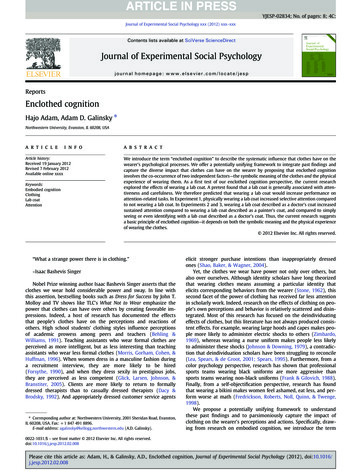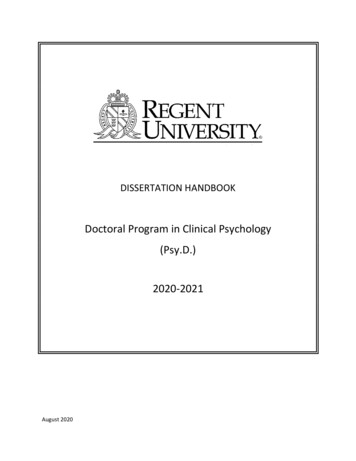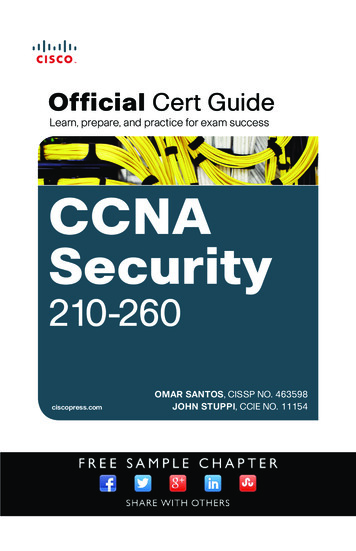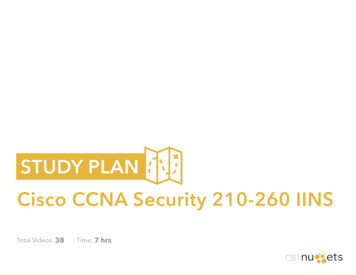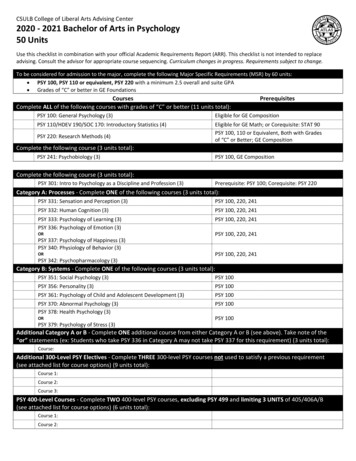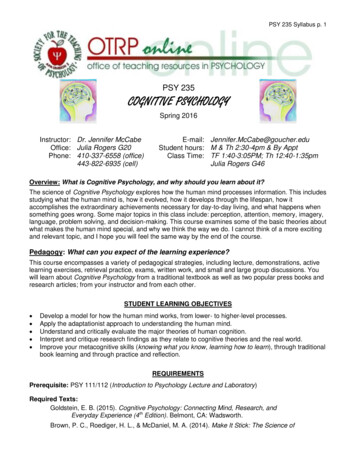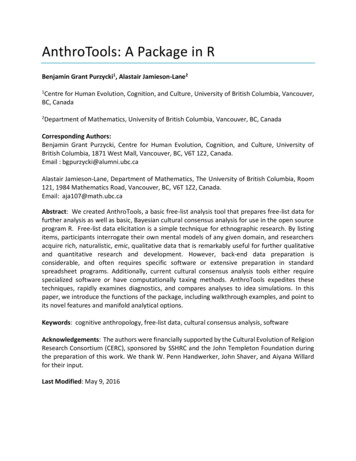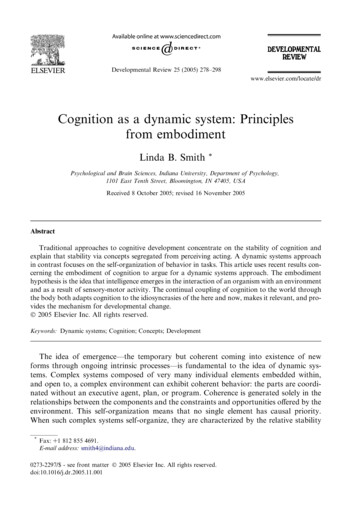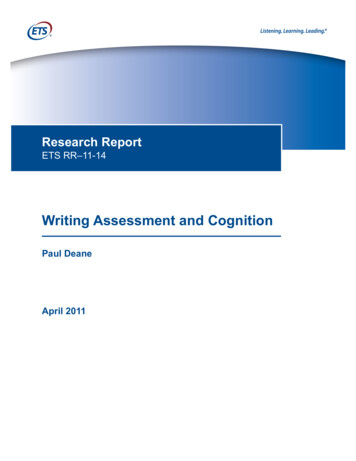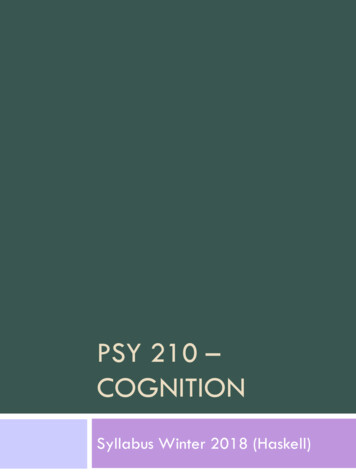
Transcription
PSY 210 –COGNITIONSyllabus Winter 2018 (Haskell)
LogisticsThis class meets Monday, Wednesday, and Fridayfrom 11:30-12:50 pmWe meet in HH 345
InstructorThe instructor is Dr. Todd Haskell. There arethree ways you can reach him outside ofclass time.Visit AI 486Monday 4:00-5:00Wednesday 10:00-11:00Friday 1:00-2:00or by appointmenttodd.haskell@wwu.edu360-650-2720 (voice only)
TextbookThe textbook is “Cognitive Psychology: ConnectingMind, Research, and Everyday Experience” (4thedition). It is by Goldstein. It is published byCengage. It looks like this:The textbook is available at the bookstore. Butyou can buy or rent it from whomever you like, inwhatever form you like, as long as you get the 4thedition.
CanvasMany aspects of this course are online Chapter outlines Lecture slides Study materials Assignment descriptions GradesWe will use the Canvas system for this. It isavailable at https://wwu.instructure.com.
AnnouncementsFrom time to time, I will need to conveyimportant information to the class outside ofclass time. I use the Announcements feature inCanvas to do this. If I need to reach individualstudents, I will use the messaging feature inCanvas.You can change the settings in Canvas tocontrol whether you will be notified of suchannouncements and messages, and where theywill be sent (e-mail, text message, etc.). Makesure you send them someplace where you willsee them.
Goals for the courseThis class connects with 4 of the 8 goals for thepsychology major.This ClassWhat are themajor issues,concepts, andtheories incognitivepsychology?Psych Major Goalsdemonstrateknowledge ofpsychological theoryacross a broad rangeof content areasevaluate data anddraw appropriateconclusionsHow e criticalthinkingHow cancognitivepsychology beapplied in thereal world?recognize applicabilityof psychologicaltheories and principlesin real world settingsdesign and implementtheoretically based andmethodologically soundresearch projectscommunicate effectivelyrecognize that you are aproduct of and participant ina dynamic sociocultural systemthat includes similarities anddifferences with othersview their education inpsychology as relevant to theirlives post-graduation
Learning activitiesThere are several ways you willwork toward these goalsAttending lectureReading the textbookLab activitiesInvolvement in research
AssessmentAnd there are several ways that yourprogress toward those goals will be assessedIn-class examsOn-line reading quizzesResearchparticipation creditsLab activities
AssessmentHere’s how the different types of assessmentswill be weighted when calculating yourcourse gradeResearchcredits5%Readingquizzes15%Lab activities25%Exams55%
AssessmentScores on all these assessments will becombined to give you an overall percentagescore for the course. Here are the scores youneed to exceed in order to earn a givenletter grade. For example, to earn a C ,your score needs to exceed 76.00%.AA- 93.00%B 90.00%B 86.00%B- 83.00%C 80.00%C 76.00%C- 73.00%D 70.00%D 66.00%D- 63.00%60.00%
Other sources of informationThis is not a complete description of thiscourse. There are several documentsposted on Canvas that supplement thisone: A class scheduleA set of course policiesDetailed descriptions of the quizzes, exams,and assignmentsMake sure you read those documents. Youare responsible for what is in them.
PSY 210 – CognitionWinter 2018Class ScheduleNotes:1) Topic dates are tentative and are subject to change2) Reading quizzes are due by the beginning of class on the day the corresponding chapter is listedon the schedule3) Lab report due dates are still to be determinedWeek Day 23/14233/16Finals 3/19TopicOverviewIntroduction to Cognitive PsychologyMLK JR DAY – NO CLASSCognitive NeurosciencePerceptionPerception (cont.)AttentionAttention (cont.)EXAM 1Short-Term and Working MemoryShort-Term and Working Memory (cont.)Long-Term MemoryLong-Term Memory (cont.)Long-Term Memory (cont.)EXAM 2Everyday Memory and Memory ErrorsKnowledgePRESIDENTS DAY – NO CLASSKnowledge (cont.)Visual ImageryLanguageEXAM 3Language (cont.)Language (cont.)Problem SolvingProblem Solving (cont.)Judgment, Decisions, and ReasoningJudgment, Decisions, and Reasoning (cont.)Wrap-up and Course EvaluationsEXAM 4 3:30-5:30ReadingGoldstein Chapter 1Goldstein Chapter 2Goldstein Chapter 3Goldstein Chapter 4Goldstein Chapter 5Goldstein Chapter 6Goldstein Chapter 7Goldstein Chapter 8Goldstein Chapter 9Goldstein Chapter 10Goldstein Chapter 11Goldstein Chapter 12Goldstein Chapter 13
PSY 210 – CognitionCourse PoliciesUse of E-mail to Communicate with the Instructor/TA1) E-mail should not be used to ask for information that can be found in the syllabus, or which has beenprovided in other documents available on Canvas. Messages asking for such information will beignored.2) Questions regarding course content should not be asked via e-mail. It is usually very difficult to explainconcepts in an e-mail, and attempts to do so often lead to confusion and misunderstanding. Instead, youare encouraged to ask a classmate, or come to office hours.3) E-mail is the preferred way to notify the instructor if you will be unable to take an exam or submit anassignment on time, or for other communications where it is important to have a record of what was saidand when.4) You should allow one business day for the instructor to respond to an e-mail before re-sending themessage. In particular, you should not expect responses on weekends or outside of business hours.Use of Electronic Devices in ClassElectronic devices may only be used in class for class-related purposes (like taking notes). Texting your friendsduring class, checking your Facebook page, or making on-line purchases are not acceptable.Arriving or Leaving in the Middle of ClassYou are expected to arrive at class on time, and remain in class until it is over. I recognize that from time totime, a student may need to arrive late or leave during the class period. In that case, you should try to sit nearthe back on an aisle, so that your arrival/departure causes as little disruption as possible.Note that behavior that interferes with the ability of other students to learn is considered a violation of theStudent Conduct Code, and can lead to disciplinary action. Getting up and leaving in the middle of class countsas such interference, because it is highly distracting to both me and the other students in the room. Repeated orflagrant violations of this policy will be reported to the Office of Student Life.If you are likely to need to leave class on a regular basis due to DRS accommodations, a medical condition, orsome similar reason, please find a time to introduce yourself to me (before or after class, during office hours) sothat I will not think you are ignoring the policy when you leave.IllnessIf you have a cold, the flu, or any other contagious illness, you should not attend class. You will not bepenalized for missing class due to illness, however, you are responsible for checking with a classmate regardingwhat you missed, and going over the material we covered on your own time. If you still have questions afterdoing that, you should come to office hours or make an appointment with me. If missing class would cause youto miss an exam, you are still responsible for notifying the instructor in advance (see next section).Policy on Missed Exams1) You will be permitted to make up one exam during the quarter if either of the following applies:
a) You know you will be unable to take the exam at the regularly scheduled time, and you contact theinstructor prior to the time of the exam to make alternative arrangements. The instructor reserves theright to decide what are acceptable reasons for missing the exam, and may ask for documentation ofyour reason.b) You are unable to take the exam at the regular time due to an unforeseeable emergency, and you areable to document this emergency and explain why you couldn’t contact the instructor in advance.2) Make-up exams must be taken as soon as you are able to resume attending classes.Policy on Late Assignments1) Unless otherwise specified, all assignments are due by the beginning of class on the date indicated onthe syllabus.2) Assignments submitted late will receive a late penalty of 50%. Late assignments will not be acceptedmore than 3 days after the due date.3) A late assignment is considered excused if either of the following applies:a) You know you will be unable to submit an assignment on time and notify the instructor inadvanceb) You are unable to submit an assignment on time due to an unforeseeable emergency, and you areable to document this emergency and explain why you couldn’t contact the instructor in advanceFor an excused late assignment, you will typically receive an extension. Provided you are able to submitthe work by the end of that extension, no late penalty will be applied. However, the instructor reservesthe right to determine the appropriate duration of the extension, based on the nature of the assignmentand the circumstances. Extensions can be as short as an hour and as long as several days. If an in-classactivity depends on having an assignment completed by class time, the instructor may decide not togrant an extension.Academic IntegrityAcademic integrity is about what kind of people we are – our character and our respect for both others andourselves. And in this class, it is also about respect for the process of science. Cheating on an exam is likemaking up data, and plagiarism is like claiming someone else’s discovery as your own.Because science relies on a free exchange of ideas, students are encouraged to discuss material and assignmentswith anyone they wish. However, unless otherwise indicated, the actual assignments and exams must be thestudent's own work. Furthermore, student work should clearly distinguish between the student's own words andideas, and words and ideas taken from someone else, using quotation marks and citations as appropriate. Whenin doubt, consult the instructor. More information about academic integrity can be found athttp://www.wwu.edu/integrity/.Students with DisabilitiesStudents requesting academic accommodations in this class based on a disability should make a request throughdisAbility Resources for Students (DRS) no later than the first week of classes. DRS can be contacted via email at drs@wwu.edu or by phone at (360) 650-3083 and is on the web at http://www.wwu.edu/drs/.Dealing with Serious Illnesses, Emergencies, and other CrisesFrom time to time students experience a serious illness, emergency, or other crisis during the quarter. Westernprovides several resources to support students during difficult times, and you are encouraged to seek out supportand assistance as early as possible. In the case of a medical concern or question, please contact the Health Center: 650-3400 orhttp://www.wwu.edu/chw/student health
In the case of an emotional or psychological concern or question, please contact the Counseling Center: 6503164 or http://www.wwu.edu/counseling/ In the case of a non-emergency health and safety concern, please contact the University Police: 650-3555 orhttp://www.wwu.edu/ps/police/ In the case of a family or personal crisis or emergency, please contact the Office of Student Life:650-3706 or http://www.wwu.edu/dos/office/slo student assistance.shtml To seek confidential support related to sexual violence, please contact CASAS (650-3700 orhttp://www.wwu.edu/pws/about casas.shtml), the Student Health Center, and/or the Counseling Center. Toreport sexual violence, please contact University Police, Bellingham Police, and/or the Title IX Coordinator inWestern’s Equal Opportunity Office (650-3307 or http://www.wwu.edu/eoo/). Faculty are responsibleemployees who are required to report sex discrimination, including sexual violence that they learn about, to theTitle IX Coordinator.Contact information checked and updated 9/20/17
Textbook The textbook is “Cognitive Psychology: Connecting Mind, Research, and Everyday Experience” (4th edition). It is by Goldstein. It is published by Cengage. It looks like this: The textbook is available at the bookstore. But you can buy or rent it from whomever you like, in wh

